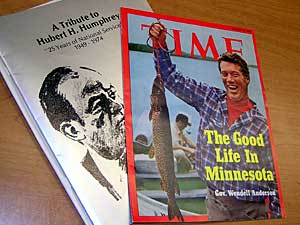Audio
Photos
Your Voice
| ||||||||||||||||||||||||||||||||||||||||||||
Is Minnesota still a DFL state?
May 21, 2004
 |
| Gov. Wendell Anderson on the cover of Time Magazine in the mid-1970s, at the height of the DFL-led "Minnesota Miracle." (File photo) |
St. Paul, Minn. — Five years ago the anti-establishment entertainer Jesse Ventura dealt the political status quo an unexpected blow when Minnesotans elected him governor.
Ventura's 1998 election also marked the end of the DFL's nearly 30-year domination of Minnesota politics. The Democratic candidate for governor, Skip Humphrey, garnered just 28 percent of the vote. In conceding defeat, Humphrey promised better times ahead for the party.
 | |||
"If you believe in Minnesota as I do, then we know tomorrow will be brighter," he said then.
The showing by the son of political icon Hubert Humphrey was the worst of any DFL gubernatorial candidate since the party's creation in the mid 1940's, when Minnesota Democrats and Farmer Laborites joined forces.
In addition to failing to win the governor's office, the DFL lost control of the Minnesota House of Representatives.
The DFL had controlled the House and the Senate for nearly a quarter century. Voters in 1998 left Democrats with only a relatively narrow majority in the Senate. And that majority would narrow even more four years later.
 | |||
In 2002 Ventura stepped aside. Former Congressman Tim Penny bolted from the DFL and ran under Ventura's Independence Party banner, winning 16% of vote. Democrats lost the governor's race again. Republican Tim Pawlenty, with his 'no new taxes pledge,' defeated longtime Democratic Senate leader Roger Moe.
In October 2002, the party also lost U.S. Sen. Paul Wellstone, the party's ideological and emotional leader, when his campaign plane crashed, killing all aboard.
MPR political analyst - Democratic strategist Bob Meek - says it has become clear, the third party movement has stung the DFL and improved circumstances for the GOP.
"The tough invention in Minnesota politics in recent years has been the rebirth of third parties. So now in order to beat a Republican you actually have to get this coalition to come together and as long as we're separated, as long as there's so many votes for Tim Penny and so many votes for Roger Moe then the one guy who isn't splitting any votes -- Tim Pawlenty -- wins the election," Meek says.
Despite Democrats relative stronghold on power in Minnesota in the last part of the 20th century, it's a widely held misconception that Minnesota has long been a bastion of Democratic strength, according to University of Minnesota History Professor Hy Berman.
 | |||
"If you look at it from the total historical perspective from 1859 on, actually 1860 on, the state has been a Republican state," Berman says.
He says many people think of Minnesota as a Democratic state because in recent history Minnesota produced several well known Democrats; Hubert Humphrey, Eugene McCarthy, Walter Mondale. The reality, Berman says, is altogether different.
"If you look at who the governors are you see it's evenly divided, even the last 50 years," Berman says. "The state Senate has been Democratic ever since in 1973 but was Republican from 1860 to 1973. The House, has been more Democratic than Republican in the last 50 years, but the House has had Republican control, as it has now, periodically through the time. Well how do you define it? A Democratic state? A Republican State? On balance it's more Republican than a Democratic state historically."
|
I think we've licked our wounds and we're coming back and I think we're smarter, faster and better and more united
- Ted Mondale |
Berman says strong parties often force weak parties to become more competitive; to drop infighting and to unite and to sharpen their mission. Democrat Ted Mondale, son of the former Vice President, says that's exactly what's happening in the Minnesota DFL right now.
"I think we've licked our wounds and we're coming back and I think we're smarter, faster and better and more united than we were in the past and understand that we need to do business in a different way," Mondale says.
But Republican Chris Georgacus, who chaired the Minnesota GOP in the mid 1990's and ran Tim Pawlenty's gubernatorial campaign, is convinced the current trend toward Republicans will continue.
"I believe that Democrats are still coping with a series of election disappointments over the last several years and unless the Democrats come up with a program that's going to be more attractive to voters, the march of the Republican party toward permanent majority status is going to happen."
 | |||
Ted Mondale concedes, when Democrats were the majority party in Minnesota they lost focus and became smug. He says the way for DFL'ers to win back support is to convince voters they are good stewards of the taxpayers' dollars.
"The Democrats are always going to be seen as the party of government and we always think about government as a real tool to help people in their lives." Mondale says. "It needs to be a tool about opportunity, not about a handout and these systems need to be fiscally accountable if people are going to accept the Democratic view on a lot of issues and policies. If we're not able to convince the public with pure evidence that that's where we're headed, then we're not going to be the majority party again."
Mondale, who initially supported Howard Dean's candidacy, says he and other Minnesota Democrats are rallying around John Kerry. He says the party is more united now than it's ever been. Democrats are hoping that unity will transfer into gains for the party's national and Minnesota candidates this fall.
|
News Headlines
|
Related Subjects
|

